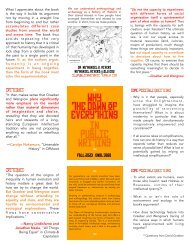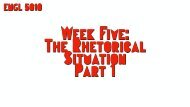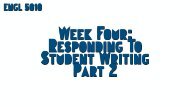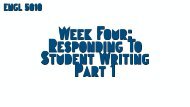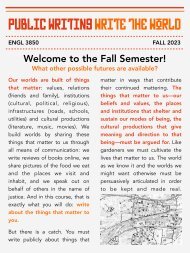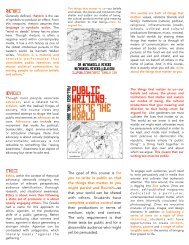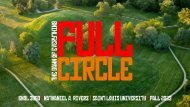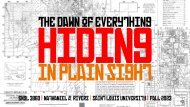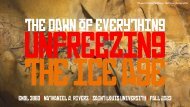You also want an ePaper? Increase the reach of your titles
YUMPU automatically turns print PDFs into web optimized ePapers that Google loves.
Writing<br />
style<br />
with<br />
engl <strong>4120</strong><br />
spring 2024<br />
slustyle.tumblr.com<br />
mwf: 12 00 -12 50<br />
dr. nathaniel a. rivers<br />
nathaniel.rivers@slu.edu<br />
office hours: mw 1 00 -2 30<br />
Course Introduction<br />
This course is about style, how we analyze it, how we cultivate it. Our goal in this course is to expand<br />
our stylistic repertoires. We will do this by digging into sentences—clauses, phrases, words, and<br />
punctuation—to see how even the smallest units of writing can persuade. We’ll begin with some<br />
grammar review, not to ensure “correctness” (a word whose meaning and effects we will closely<br />
examine), but rather to understand the way sentences work rhetorically. Far from being the stuffy<br />
domain of reactionary pedants, grammar is historically related to practices of magic (hence the<br />
etymological relation between “grammar” and “glamor”). As is appropriate for magicians, we will<br />
learn an esoteric language—figures and tropes such as parataxis, hypotaxis, syntaxis, diacope,<br />
epistrophe, apostrophe, synecdoche, metonymy, and many more. And like magicians, we’ll spend<br />
much of our time practicing, experimenting—looking at your writing, trying on different styles through<br />
repetition and imitation. Here is what I hope for you by the end of this course:<br />
1. That you appreciate the difference between prescriptive and descriptive accounts of language.<br />
2. That you discern how different situations call for different styles.<br />
3. That you deploy grammatical and stylistic vocabulary with confidence and accuracy.<br />
4. That you cultivate a rhetorically sophisticated repertoire of styles.<br />
5. That you enjoy written style: that working with words gives you pleasure and delight.<br />
Course Elements<br />
The course consists of a commonplace book, several short exercises, three major assignments, and a<br />
portfolio that will include revisions and an explanatory letter. I will ask you to keep copies of all these<br />
assignments in Google Drive folders so that you can access them all at the end of the course. There is<br />
also a brief final exam on the terminology that we’ll be learning throughout the course. N.B.: the<br />
descriptions I provide here of the major assignments are only sketches. As we approach the major<br />
assignments, we will read examples of the genres, describe them, and apply those descriptions to<br />
your own writing.<br />
Commonplace Book<br />
Emerging in Early Modern Europe, commonplace books were privately made and held collections of<br />
information, which would include snippets of text, phrases or words to remember, and even bits of<br />
verse. I’d like you each to keep a commonplace book. With this commonplace book, you will compile<br />
things that might become elements of your own styles. What turns of phrase, words, sentence, images<br />
and photographs inspire you? A notebook will be provided to this end. All that the commonplace<br />
<strong>ENGL</strong> <strong>4120</strong>: Writing with Style | Spring 2024 | 1
ook requires of you is the selection and collection of such stylistics elements. You’ll need a keen eye<br />
and an attuned ear along with scissors and glue.<br />
Exercises<br />
As the name suggests, this course element will ask you to complete short exercises in which you apply<br />
a stylistic principle to your own writing. These are essentially experiments in which you’ll be asked to<br />
deploy a figure, imitate a style, or edit and revise a text. Most of these assignments will be very brief,<br />
fewer than 100 words.<br />
Extended Exercise: Copia<br />
At the start of the semester, you will be issued a second, smaller notebook. In this notebook you will<br />
practice an exercise developed by Desiderius Erasmus in his early 16th Century work De Utraque<br />
Verborum ac Rerum Copia. Designed to help a writer develop an abundance of styles, Erasmus<br />
proposes and then performs the (re)writing of the same sentence over and over gain. To this end,<br />
Erasmus writes around 200 versions of the sentence “Your letter delighted me very much.” Over the<br />
course of the semester, you will do the same. We will share the fruits of our copia at various points<br />
during the semester.<br />
Major Assignments<br />
The course features three main writing assignments: the “Why I Write” essay, the Personal Statement,<br />
and the Open Letter. Each of these should run 800-900 words. For each of these assignments, we’ll<br />
follow the same basic procedure.<br />
• Analysis: First, we’ll read a few examples of the genre in order to familiarize ourselves with its<br />
structure, its moves, rhetorical situation, and purpose.<br />
• Proposal: You’ll then write a brief proposal for your version of the assignment, no more than 300<br />
words. The proposal will outline how you’ll address the genre requirements that we observe in the<br />
examples that we read.<br />
• Draft: Once I’ve had a chance to look at the proposal and make some suggestions, you’ll then<br />
produce a draft of about 400 words, or about half the length of the full assignment. We will<br />
workshop some of the drafts in class, and I will respond to all of them. You’ll also receive peer<br />
review on your drafts.<br />
• Final draft: You’ll then revise the draft according to the feedback you’ve received. The final draft<br />
should run 800-900 words.<br />
Portfolio Assignment<br />
This assignment, which will come at the end of the course, will ask you to do two things: to revise at<br />
least one of your major assignments and to write an essay presenting your work throughout the<br />
semester.<br />
First, you’ll revise at least one of your three major assignments. At this point in the course, you’ll<br />
have drafted and revised it once already. This will be a further opportunity to refine and polish your<br />
work.<br />
Second, you’ll write a portfolio essay of 1800 words. This essay will present the work you’ve done<br />
in the course. You’ll analyze your own work according to the stylistic principles we’ve been<br />
studying throughout the course. You will discuss the stylistic experiments you performed in the<br />
exercises, the forms you’ve applied to your own writing, and the ways in which your style has<br />
changed. You’ll also draw on secondary sources to present your work. These sources will include<br />
<strong>ENGL</strong> <strong>4120</strong>: Writing with Style | Spring 2024 | 2
our main texts, but also sources that I will put on reserve, along with any sources you find in your<br />
own research. You’ll use these sources to bolster your claims about your stylistic choices (though of<br />
course you can also use them to explain why you reject “common sense” stylistic advice). Finally,<br />
this essay will ask you to discuss the rhetorical choices you made throughout the course regarding<br />
purpose, audience, and context. You will reflect on how and why you constructed the appeals you<br />
made.<br />
Final Exam<br />
The course will feature a brief final exam on terminology we will learn throughout the class.<br />
Course Texts<br />
Virginia Tufte, Artful Sentences, 978-0961392185<br />
Mark Forsyth, Elements of Eloquence, 978-0-425-27618-1<br />
All other short readings will be provided on Google Drive.<br />
Course Concepts<br />
Rhetoric<br />
Most generally defined, rhetoric is the use of symbols to produce an effect (e.g., a verbal command to<br />
“Stop,” a red traffic light, or a Journey song imploring us “Don’t Stop Believing”). Rhetoric assumes<br />
that the use of language is symbolic action. The famous “word vs. deeds” distinction has no place<br />
here. Though rhetoric has become a negative word within political circles and contemporary media, it<br />
has a rich history as one of the oldest intellectual pursuits in the Western world. With a focus on<br />
audience, context, and identification, rhetoric is a potent motive force within a community. As Kenneth<br />
Walker has written, “rhetoric is a material and semiotic performance that constitutes public<br />
identities and shares political communities by moving people to collective beliefs and actions.”<br />
Rhetoric also brings to the table a particular approach to language. As a result of many historical and<br />
cultural trajectories, language use is largely understood as an activity steeped in signification. In<br />
short, signification describes the production and understanding of meaning—words, when understood<br />
in terms of signification—mean, they represent. The primary goal of language (and of rhetoric) in this<br />
model, then, is to convey that meaning, to communicate some content. But this is not the only way to<br />
treat language. John Muckelbauer writes, “to my mind, rhetoric has always encouraged [going all the<br />
way back to the sophists of Ancient Greece] something different than this signifying approach to<br />
language. More precisely, I think rhetoric offers the possibility of attending to a dimension of language<br />
that is irreducible to the entire apparatus of signification.” For Muckelbauer, and for us, rhetoric allows<br />
us to ask different sorts of questions. Rhetoric asks "what force does language have?“<br />
How can it impact actions? What effects does it produce (one of which may be "meaning")? In its<br />
classical incarnation, in the work of Gorgias and other "sophists;' if I want to persuade the polis of<br />
something, I'm not necessarily trying to get them to simply comprehend my message or even<br />
trying to get them to understand anything at all; I'm primarily just trying to get them to do<br />
something. (Of course in this classical version, I would likely want them to at least understand what<br />
I want them to do, but such understanding would not be the goal of my discourse, only a hinge<br />
toward that goal.)<br />
We will engage rhetoric, and so style, primarily in terms of what it does. One thing rhetoric might<br />
do is mean, but it does many more things besides.<br />
<strong>ENGL</strong> <strong>4120</strong>: Writing with Style | Spring 2024 | 3
Style<br />
Our understanding of rhetoric necessarily shapes our engagement with style. Style is not merely the<br />
dressing up of language. Style is not simply a superficial addition atop substance. The common<br />
expression “style vs. substance” has no place here. This binary presumes a world of inert matter, stable<br />
concepts, and static beings over which style is sprinkled like so much seasoning. But we must ask, is<br />
KFC still KFC without the Colonel’s famous blend of 11 herbs and spices? Style is constitutive of<br />
substance. Style generates effects and those effects extend down into and around that which is<br />
styled. Style makes. Style changes. Style puts into motion. Style substantiates.<br />
It is also important to acknowledge, in the context of rhetoric, that’s one’s style is never entirely<br />
one’s own. Whatever a given style might be, that style is composed of (or cobbled together from)<br />
what we find at hand. To write is to participate in both language and culture. To write is to participate<br />
in language, which moves us and makes our minds. Research suggests that we think in and with<br />
language. The language available to us affords and constrains how and what we write: vocabulary,<br />
concepts, patterns of thought. To write is to participate in culture, which is composed, in part, through<br />
shared texts: laws, religious writings, literature, codes of conduct, advertisements. Culture supplies the<br />
forms and expectations that shape how, when and why we write. Thus, we don’t so much as have a<br />
style as we participate in stylings.<br />
Transduction<br />
Transduction, which I’ll define in just a second, is a term related to possibly more familiar terms like<br />
induction, deduction and education. All these terms share the Latin root word duce, which means “to<br />
lead.” Education leads out, induction leads into, and deduction leads us down These related terms<br />
capture ways of thinking that are also always forms of movement. Education draws students out in the<br />
world. Deduction discerns general principles from a world of particulars. Transduction—meaning “to<br />
lead across”—describes a movement transforming that which is moving. In his “Posthumanism as<br />
Postscript,” Casey Boyle writes, "Where transfer denotes carrying something from one domain to the<br />
next […], transduction describes the process through which something changes as it moves across<br />
domains” (195). And this something isn’t singular; it emerges because of transduction.<br />
Recall the experience of hearing your recorded voice. Is that how I really sound? Well, yes and no. Yes,<br />
because your voice is always mediated, and no, because as always mediated there is no one way<br />
“your” voice always sounds. Your voice is not a thing transmitted from one place to another. Voice is<br />
transduced over and over again across the signals in your brain, across your vocal cords, across the<br />
vibrations in the air, across the stereo-cilia of an ear, across the transducer of a condenser microphone.<br />
Any voice is always styled—each and every time brought into being through the action of<br />
transduction. We could then say that style transduces: style is what moves a some thing across and in<br />
so doing makes it what it is. Style is not then some extra flourish you add to your static and singular<br />
voice; style is the means by which any particular voice emerges.<br />
<strong>ENGL</strong> <strong>4120</strong>: Writing with Style | Spring 2024 | 4
Grading<br />
For this course, I will not be “grading” your work in the traditional sense of assigning some number or<br />
letter that is meant to indicate its quality, we’re going to practice a form of “contract grading,” by<br />
which I mean that your grade will be tied your completion of a set of tasks. The more tasks you<br />
complete, the better your grade is. Why do this? For many reasons, which can all be boiled down to<br />
one: if I don’t slap letters on your papers, you’re more likely to read the feedback and—even more<br />
importantly—revise according to the feedback. For a writing intensive class, it’s the feedback that’s<br />
important, so that’s what I want to concentrate on.<br />
Here’s how we’re going to make that happen. Below, I have five columns, each one of which lists the<br />
tasks you must complete in order to achieve the given grade. If you want an A, you’ll have to do<br />
everything listed in that column. (Notice the adjectives “complete” and “revised.” To have any<br />
assignment count, you need to complete it fully. Just slapping something together will not count as a<br />
“completed” assignment. For revisions, you must revise according to my feedback. If you submit a<br />
“revision” that isn’t really revised, then it’s not going to count as a revision.) 1<br />
A B C D F<br />
2 complete major<br />
assignments<br />
2 complete major<br />
assignments<br />
1 complete major<br />
assignment<br />
1 complete major<br />
assignment<br />
1 complete major<br />
assignment<br />
2 revised portfolio<br />
assignments<br />
1 revised portfolio<br />
assignment<br />
1 revised portfolio<br />
assignment<br />
1 revised portfolio<br />
assignment<br />
0 revision for<br />
portfolio<br />
1 portfolio letter<br />
1 portfolio letter<br />
1 portfolio letter<br />
0 portfolio letter<br />
0 portfolio letter<br />
9-10 Exercises<br />
7-8 Exercises<br />
5-6 Exercises<br />
4 or fewer exercises<br />
4 or fewer exercises<br />
150-200 sentences<br />
100-150 sentences<br />
50-100 sentences<br />
0-50 sentences<br />
0-50 sentences<br />
90% on final exam<br />
80% on final exam<br />
70% on final exam<br />
60% on final<br />
60% on final<br />
1 extension<br />
1 extension<br />
2 extensions<br />
2 extensions<br />
3 extensions<br />
maximum 3 UAs<br />
maximum 4 UAs<br />
maximum 5 UAs<br />
6 or more UAs<br />
6 or more UAs<br />
Punctual<br />
Punctual<br />
Sometimes late<br />
Frequently late<br />
Frequently late<br />
1 As a reminder, this is SLU’s grading scale, which I am obliged to include even though it doesn’t really work for<br />
our course: A 100-93; A 92-90; B+ 89-87; B 86-83; B- 82-80; C+ 79-77; C 76-73; C- 72-70; D 69-63; F 62 and<br />
below<br />
<strong>ENGL</strong> <strong>4120</strong>: Writing with Style | Spring 2024 | 5
Course Goals<br />
Eloquentia Perfecta 4: Writing Intensive<br />
This course is part of the Saint Louis University Core, an integrated intellectual experience completed<br />
by all baccalaureate students, regardless of major, program, college, school or campus. The Core<br />
offers all SLU students the same unified approach to Jesuit education guided by SLU’s institutional<br />
mission and identity and our nine undergraduate Core Student Learning Outcomes (SLOs).<br />
The Writing Intensive course requirement is one of 19 Core Components. The University Core<br />
SLO(s) that this component is designed to intentionally advance are listed below:<br />
University Core Student Learning Outcomes<br />
The Core SLO(s) that this component is intentionally designed to advance are:<br />
• SLO 3: Assess evidence and draw reasoned conclusions<br />
• SLO 4: Communicate effectively in writing, speech, and visual media<br />
Additionally, the Core Component-level Student Learning Outcomes are listed below:<br />
Component-level Student Learning Outcomes<br />
Students who complete this course will be able to:<br />
• Write effectively for specific purposes and audiences<br />
• Analyze and synthesize claims from a variety of sources<br />
• Engage in processes of invention and revision that enable evaluation of their own and others’<br />
rhetorical choices in written messages and arguments<br />
• Reflect on the ways in which rhetorically proficient written communication contributes to ethical<br />
public discourse<br />
Department Goals<br />
4000 level Rhetoric & Writing Courses<br />
Here are the Department’s standard-issue outcomes for what you will do in this course. By the course’s<br />
end, we will have done all of these things:<br />
• Design multimodal arguments and persuasive messages for complex situations, including<br />
academic, public, and professional;<br />
• Produce arguments that situate various theories of rhetoric, writing, and pedagogy within their<br />
own historical contexts and in relation to ours;<br />
• Use disciplinary knowledge in rhetorical history, writing theory, and pedagogy, to respond to<br />
particular situations and audiences.<br />
Course Policies<br />
Attendance and Tardiness: These policies are spoken to in the grading criteria, so I don’t need to add<br />
anything here except that I will obviously make accommodations where necessary for illness or other<br />
emergencies. The best advice I can give you is to come to class, and if you can’t come to class, contact<br />
me and keep me informed if you have to miss class. Don’t disappear. That’s where the problems start.<br />
Meanwhile, here is the required university statement on attendance. We will of course abide by it.<br />
<strong>ENGL</strong> <strong>4120</strong>: Writing with Style | Spring 2024 | 6
Deadlines: Work is due when it is due. But I realize that things happen. That is why I have included<br />
extensions within the grading criteria.<br />
Submissions: We will use Google Drive to manage the paper exchange and to do in-class work. Bring<br />
your laptops. We won’t use them every day, and I will sometimes ask you to close them in order to<br />
give your attention to the conversation.<br />
Academic Integrity<br />
Academic integrity is honest, truthful and responsible conduct in all academic endeavors. The mission<br />
of Saint Louis University is “the pursuit of truth for the greater glory of God and for the service of<br />
humanity.” Accordingly, all acts of falsehood demean and compromise the corporate endeavors of<br />
teaching, research, health care, and community service through which SLU fulfills its mission. The<br />
University strives to prepare students for lives of personal and professional integrity, and therefore<br />
regards all breaches of academic integrity as matters of serious concern. The full University-level<br />
Academic Integrity Policy can be found on the Provost's Office website here. Additionally, each SLU<br />
College, School, and Center has its own academic integrity policies, available on their respective<br />
websites. The College of Arts and Sciences policy can be found here.<br />
Title IX Statement<br />
Saint Louis University and its faculty are committed to supporting our students and seeking an<br />
environment that is free of bias, discrimination, and harassment. If you have encountered any form of<br />
sexual harassment, including sexual assault, stalking, domestic or dating violence, we encourage you<br />
to report this to the University. If you speak with a faculty member about an incident that involves a<br />
Title IX matter, that faculty member must notify SLU’s Title IX Coordinator that you shared an<br />
experience relating to Title IX. This is true even if you ask the faculty member not to disclose the<br />
incident. The Title IX Coordinator will then be available to assist you in understanding all of your<br />
options and in connecting you with all possible resources on and off campus.<br />
Anna Kratky is the Title IX Coordinator at Saint Louis University (DuBourg Hall, room 36;<br />
anna.kratky@slu.edu; 314.977.3886). If you wish to speak with a confidential source, you may contact<br />
the counselors at the University Counseling Center at 314.977.TALK or make an anonymous report<br />
through SLU’s Integrity Hotline by calling 1.877.525.5669 or online. To view SLU’s policies, and for<br />
resources, please visit the following website.<br />
Disability Accommodations<br />
Students with a documented disability who wish to request academic accommodations must formally<br />
register their disability with the University. Once successfully registered, students also must notify their<br />
course instructor that they wish to use their approved accommodations in the course.<br />
Please contact the Center for Accessibility and Disability Resources (CADR) to schedule an<br />
appointment to discuss accommodation requests and eligibility requirements. Most students on the<br />
St. Louis campus will contact CADR, located in the Student Success Center and available by email or<br />
by phone at 314.977.3484. Once approved, information about a student’s eligibility for academic<br />
accommodations will be shared with course instructors by email from CADR and within the instructor’s<br />
official course roster. Students who do not have a documented disability but who think they may have<br />
one also are encouraged to contact to CADR. Confidentiality will be observed in all inquiries.<br />
<strong>ENGL</strong> <strong>4120</strong>: Writing with Style | Spring 2024 | 7
University Writing Services<br />
Students are encouraged to take advantage of University Writing Services (UWS); getting feedback<br />
benefits writers at all skill levels. Trained writing consultants can help with writing projects, multimedia<br />
projects, and oral presentations through one-on-one consultations. For more information, visit their<br />
website or call the Student Success Center at 314.977.3484.<br />
Assessment & Submission of Work<br />
The Saint Louis University Department of English is committed to excellent and innovative educational<br />
practices. In order to maintain quality academic offerings and to conform to relevant accreditation<br />
requirements, we regularly assess our courses and programs for evidence of student learning<br />
outcomes achievement. For this purpose, we keep on file representative examples of student work<br />
from all courses and programs such as: assignments, papers, exams, multimedia presentations,<br />
portfolios, and results from student surveys, focus groups, and reflective exercises. Thus, copies of<br />
your work for this course—including exams, presentations, submitted papers or other assignments—<br />
may be kept on file for institutional research, assessment and accreditation purposes. All samples of<br />
student work will be anonymized before they are used in assessment exercises. If you prefer that the<br />
Department of English does not keep your work on file, you need to communicate your decision in<br />
writing to your instructor.<br />
Course Calendar<br />
Monday Wednesday Friday<br />
1/22<br />
Gass, “The Ontology of the<br />
Sentence, or How to Make a World<br />
of Words” (Drive)<br />
1/29<br />
Forsyth, Elements, 17-27, 146-53<br />
Orwell, “Why I Write” (Drive)<br />
2/5<br />
Forsyth, Elements, 28-36<br />
Ex. 03: Antithesis & Alliteration<br />
Why I Write Proposal Due<br />
2/12<br />
Tufte, “Verb Phrases,” 63-90<br />
Forsyth, Elements, 50-54<br />
2/19<br />
“Why I Write” Final Draft Due<br />
1/17<br />
Course Introduction<br />
1/24<br />
Forsyth, Elements, 1-9, 233-37<br />
Exercise 01: Grammar<br />
Demonstration<br />
1/31<br />
Williams, “Why I Write” (Drive)<br />
Didion, “Why I Write” (Drive)<br />
2/7<br />
Forsyth, Elements, 40-49<br />
Ex. 04: Grade Proposal<br />
2/14<br />
Writing Workshop<br />
“Why I Write” Draft Due<br />
2/20<br />
Forsyth, Elements, 55-68<br />
Tufte, “Dependent Clauses,”<br />
139-54<br />
1/19<br />
Muckelbauer, “Signification” (Drive)<br />
1/26<br />
Tufte, “Short Sentences,” 9-34<br />
Exercise 02: Grammar<br />
“Diagnostic”<br />
2/2<br />
Forsyth, Elements, 23-27<br />
Tufte, “Noun Phrases,” 37-63<br />
2/9<br />
Wellness Day (no classes)<br />
2/16<br />
Writing Workshop<br />
2/22<br />
Tufte, “Adjectives and Adverbs,”<br />
91-110 and “Prepositions,” 111-24<br />
<strong>ENGL</strong> <strong>4120</strong>: Writing with Style | Spring 2024 | 8
2/26<br />
Tufte, “Conjunctions and<br />
Coordination,” 125-38<br />
Forsyth, Elements, 68-85<br />
3/4<br />
Purdue OWL: Personal Statements<br />
(links & handouts in Drive)<br />
Personal Statement Prop. Due<br />
3/11<br />
Spring Break (No Class)<br />
3/18<br />
Writing Workshop<br />
3/25<br />
Tufte, “The Appositive,” 189-204<br />
Forsyth, Elements, 98-112<br />
Ex. 07: TBD<br />
4/1<br />
Easter Monday (no classes)<br />
4/8<br />
Tufte, “Free Modifiers,” 171-88<br />
Ex. 08: TBD<br />
Open Letter Proposal Due<br />
4/15<br />
Writing Workshop<br />
4/22<br />
Forsyth, Elements, 136-45<br />
5/1<br />
Portfolio Revision Workshop<br />
5/8<br />
Portfolio Revision Workshop<br />
2/28<br />
Paramedic Method<br />
(links & handouts in Drive)<br />
Ex. 05: Paramedic Method<br />
3/6<br />
Paramedic Method Review<br />
Ex. 06: Paramedic Method<br />
3/13<br />
Spring Break (No Class)<br />
3/20<br />
Personal Statement Final Due<br />
3/27<br />
Tufte, “Interrogative,” 205-12 and<br />
“Parallelism,” 217-36<br />
4/3<br />
King, “Letter from Birmingham<br />
Jail” (Drive)<br />
4/10<br />
Forsyth, Elements, 113-20<br />
Ex. 09: TBD<br />
4/17<br />
Writing Workshop<br />
4/24<br />
Tufte, “Syntactic,” 253-72<br />
Forsyth, Elements, 121-35<br />
5/3<br />
Portfolio Revision Workshop<br />
Portfolio Due Date TBD<br />
Final Exam Date TBD<br />
3/1<br />
Purdue OWL: Personal Statements<br />
(links & handouts in Drive)<br />
3/8<br />
Personal Statement Draft Due<br />
Writing Workshop<br />
3/15<br />
Spring Break (No Class)<br />
3/22<br />
Tufte, “Sentence Openers,” 155-70<br />
Forsyth, Elements, 86-97<br />
3/29<br />
Good Friday (no classes)<br />
4/5<br />
Baldwin, “My Dungeon Shook”<br />
(Drive)<br />
4/12<br />
Tufte, “Cohesion,” 237-52<br />
Open Letter Draft Due on 4/6<br />
4/19<br />
Ex. 10: TBD<br />
Open Letter Final Draft Due<br />
4/26<br />
Forsyth, Elements, 9-16, 154-57,<br />
225-30<br />
5/5<br />
Portfolio Revision Workshop<br />
<strong>ENGL</strong> <strong>4120</strong>: Writing with Style | Spring 2024 | 9




